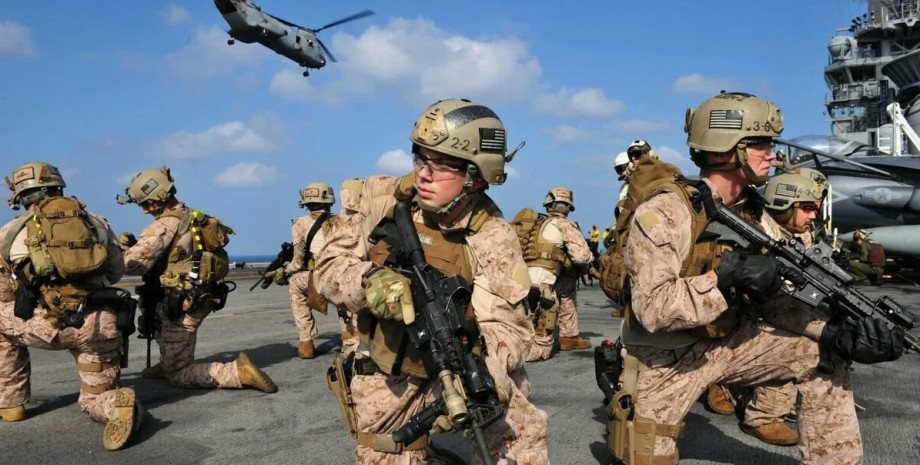
Historically, the United States was preparing to conduct two major regional conflicts (KRK) at the same time, counting on the possibilities of the Corps of Marines in the field of combined weapons. Focus has translated the article of the former headquarters of the Laboratory of Highlanders of the Corps of Marine Corps Gary Anderson about the role of Marines in a potential global conflict.
The term "axis of evil", originally introduced by President George Bush in response to the terrorist attacks on September 11, 2001, covered hostile states that sponsored terrorism and sought to create weapons of mass destruction, namely Iran, Iraq and North Korea. Of course, it is not an organization similar to the Warsaw Treaty. However, today the "axis" threatens the US with war on several fronts, which we are not ready. The new "axis of evil" consists of China, Iran, North Korea and Russia.
American intelligence suggests that there are plans to coordinate any Chinese attack on Taiwan, East Chinese or South Chinese Sea with hostilities in other countries. The most likely candidate is Iran. Russia is occupied by other cases, and North Korea is not yet ready for participation in a major regional conflict (KRK). By 2019, the United States was quite capable of war on two fronts.
The theory was to win the Main Theater of Military (in this case in China), to keep positions at a minor theater (in this case it is Iran), and then win in the second major regional conflict. The key to the strategy of the two KRK was the US Marines, which had several vital advantages for the second KRK. Earlier, Marines had the ability to respond rapidly to airy anxiety, which made it possible to transfer light infantry for twenty -four hours.
In combination with army light infantry (82th airborne, 101st air-assault and 10th mountain division), this contingent had to serve as a barrier detachment that interfere with the crossing of the departure line or blocking forces at the edge of the war zone . The real contribution of the Marines will be achieved with the arrival of the expedition unit with a small but powerful group of combined weapons, completed with armored vehicles, artillery, aviation and assault engineers.
In the example of Iran, it will be a Meu unit, constantly stationed in the Gulf/Indian Ocean region. The full potential of combined weapons in the form of a maritime expeditionary brigade (MPS) with a full set of tanks, artillery, combat aircraft and assault engineers will be deployed. In the Iranian case (the second major regional conflict) will be involved in MPS located on the island of Diego-Harcia in the Indian Ocean.
As needed, two other MPS can be added to form a full division/air group/logistical group or expeditionary forces of marine infantry (MEF) in size from the body. If necessary, MEF can strengthen additional divisions and a ticket. This is exactly what happened during the "desert shield", "brown in the desert" and "Iraqi freedom", but there is no such opportunity.
In an inexplicable way, since 2019, the Marine Corps has turned from a powerful all -military group to a combination of light infantry and coastal artillery. Even if the Marine Corps retained combat capabilities lost as a result of reduced, unsuccessful agreements on the construction of amphibious ships concluded by the Navy for the Marine Corps, would be a control shot.
These abbreviations were made to ensure that the Marines Corps could realize its poorly thoughtful concept of the first island chain focused on China. As part of the concept, the Corps purchases anti -ship missiles for use in battles in "blue waters", which are likely to never happen. Most naval and geopolitical experts are outraged by this concept and the loss of combined weapons that follows.
The recent report of the Center for Naval Analysis (CNA) expresses regret about the loss of combat capacity of united weapons. This is especially anxious because CNA is an analytical center for research and development funded from a federal budget designed to support the Marine Corps. CNA was obviously expelled from the decision -making process, as well as retired senior officers who usually advise the above current management.
Vargeaming, which is under a new concept, minimized the lack of logistical support and the viability of platforms such as middle-class landing ship. MCCDC (Command of Marines), responsible for the development of future operational concepts, also did not participate in planning power planning. The former commander and his team, who hastened to develop the concept, were overlooked or deliberately ignored the country's ability to fight and win in two major regional conflicts.










All rights reserved IN-Ukraine.info - 2022